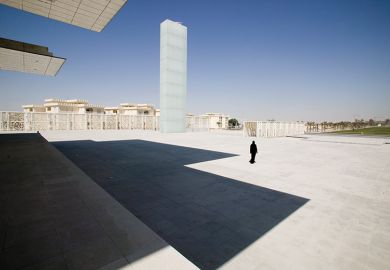Universities must make greater efforts to align their curricula and enable credit transfer if student mobility within the Middle East and North Africa is to improve, a conference has heard.
Times Higher Education’s MENA Universities Summit was told that study abroad experiences could play a vital role in improving intercultural understanding in a part of the world still riven by geopolitical divides.
But while there is significant mobility in and out of the region, Seteney Shami, founding director general of the Arab Council for the Social Sciences, said that there were huge obstacles to enabling this kind of exchange between neighbouring countries.
“Most universities in the region have very strict admission policies. Once you’re admitted into a specialisation, you can’t change it, you can’t take courses outside your specialisation. So, there isn’t really intellectual mobility even within the university, let alone to go and take a class at another university or to go abroad for a semester,” Dr Shami said. “Transferring credits is impossible.”
On top of this there are the challenges of visa regimes and campuses that have no way of allowing an overseas scholar to affiliate, let alone grant them access to the library or a workspace. “That is at the postdoc or junior faculty stage. Imagine at the [undergraduate] student level,” Dr Shami said.
She contrasted regional practices with the Bologna Process, which harmonised degrees and credits throughout Europe and allowed for greater student mobility. It was a huge effort and institutions had to undergo major structural changes, but it has enabled more mobility, Dr Shami said.
“[Europe’s policies] allow people to seek educational centres of excellence, wherever they might be,” she said.
Dr Shami admitted that it would be “ambitious” to achieve something similar across the MENA region, but suggested that it could start at a smaller scale, such as at sub-regional or even national level, to provide more opportunities to transfer educational experiences.
This would be particularly helpful for the new generation of universities in the region, with more than 200 universities established in the last 20 years, she said.
“Many of these universities are small, and they could be excellent, but they’re not going to be excellent across the board in every department with every specialisation in every topic,” Dr Shami said. “There’s just a real argument to be made for more collaboration, more mobility, whether we call it study abroad, whether we call it something else.”
She said that this applied from students to senior scholars, but it is “particularly for undergraduate students that we have a lack of opportunities and where the kind of the advantages or the benefits would be the greatest”.
The THE event is being held online in partnership with NYU Abu Dhabi.
Register to continue
Why register?
- Registration is free and only takes a moment
- Once registered, you can read 3 articles a month
- Sign up for our newsletter
Subscribe
Or subscribe for unlimited access to:
- Unlimited access to news, views, insights & reviews
- Digital editions
- Digital access to THE’s university and college rankings analysis
Already registered or a current subscriber?








